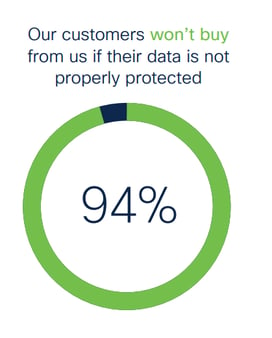How VKG enables its employees to protect their data
As a trusted partner in the finance industry VKG needed an email solution that enabled them to send data easily and securely to their many clients

In today's interconnected digital world, email is an essential communication tool for businesses of all sizes, enabling rapid information exchange and collaboration. However, its convenience also brings security risks that can have enormous consequences for your company's sensitive information, operations, and reputation. This is why implementing robust email security measures is no longer a choice but a necessity.
"Prevention is better than cure" is a well-known saying that holds true, yet organizations, both public and private, often overlook its significance. In this article, we'll explore why email security is indispensable for protecting your organization's sensitive data.
Email is often used to exchange sensitive data such as financial records, Personally Identifiable Information or personal data, client information, or intellectual property. (Learn more: What is personal data and what has secure email to do with it?)
Without proper security measures in place, this confidential data could end up in the wrong hands. It’s essential to use secure email because:
Ask yourself:
If so, a secure email solution is a must to protect this critical information from falling into the wrong hands.
Employees are an essential part of your company, but they can also inadvertently become a cybersecurity liability. Human error, like as clicking on phishing links or sending sensitive information to the wrong recipient, is a significant factor in data breaches.
Robust email security solutions are people-centric, they prioritize those who handle sensitive data on a daily basis, not just technology.
What does a people-centric security solution look like? For example:

Ask yourself:
If these questions resonate, embracing people-centric email security measures becomes crucial.
Data protection regulations such as the General Data Protection Regulation (GDPR) or the California Consumer Privacy Act (CCPA) impose strict requirements on how companies handle, store, and transmit personal data. Also, many industries have specific regulations in place to protect customer data and ensure privacy (For example, NTA 7516, HIPAA, PCI, etc.). Non-compliance can result in hefty fines and damage to your brand's reputation.
According to the latest IBM report Cost of a Data Breach 2023, organizations with a high level of noncompliance with regulations showed an average cost of USD 5.05 million, which exceeded the average cost of a data breach by USD 560,000, a difference of 12.6%.
Implementing effective email security measures helps your company stay compliant, avoid regulatory penalties, and build trust with your customers by demonstrating your commitment to data protection.
Ask yourself:
The financial implications of a data breach can be staggering, underlining the urgency of implementing stringent email security measures. According to the latest report by IBM, the global average total cost of a data breach is a staggering USD 4.45 million. This eye-opening statistic highlights the consequences that companies can face if they fail to adequately protect their sensitive information.
Beyond immediate financial losses, a data breach triggers a cascade of expenses that can haunt a business for years. From legal fees and regulatory fines to remediation efforts, reputational harm, and even potential litigation, the financial ramifications are multifaceted. Yet, the impacts go beyond mere monetary consequences. A breach can drive customer attrition, eroding trust in your brand and leading to missed business prospects.
Cisco released its 2023 Data Privacy Benchmark Study where they found that 94% of organizations say their customers won’t buy from them if data is not properly protected.

Bron: Cisco 2023 Data Privacy Benchmark Study
According to the Cisco 2023 Study, despite the difficult economic climate, privacy continues to be an attractive investment for organizations globally: “Putting spending and the estimated dollar value of the benefits together, privacy remains a very attractive financial investment for most organizations. The average organization is getting benefits estimated to be 1.8 times spending ” says the Cisco 2023 Data Privacy Benchmark Study.
Fortified email security isn't just a cost; it's an investment in preserving your financial stability and brand integrity.
Imagine if one of your clients received an email from your company, only to find out that it was sent from a compromised account. Or an employee inadvertently sends client-sensitive information to the wrong recipient. Not only would this damage your client's trust in your business, but also your reputation.
Email security isn't just about protecting data; it's about preserving the integrity of your brand. The trust your clients place in your company hinges on their confidence that their sensitive information remains confidential and untampered. A breach, whether from a compromised account or a misdirected email, can shatter that trust in an instant.
Email security plays a vital role in maintaining your company's reputation and credibility. By implementing measures to prevent data breaches, or unauthorized access and ensuring that your emails are sent from genuine sources, you can build and maintain trust with your clients, partners, and employees.

In today's fast-paced business landscape, email stands out as a time-saving solution compared to traditional methods like sending faxes or letters. However, the necessity for secure communication is equally vital. This is where people-centric email security takes the stage, amplifying productivity by ensuring ease of use and simplifying security procedures. With intuitive interfaces and real-time threat detection, employees can focus on their tasks instead of grappling with complexities. Furthermore, this approach minimizes security-related IT queries, enabling more focused efforts.
Cyberattacks and data breaches can lead to significant disruptions in your company's operations, causing downtime, loss of data, and damage to your reputation. With a comprehensive email security solution, your business can proactively defend against human error and evolving cyber threats.
By preventing successful attacks, your security teams can focus on strategic initiatives instead of firefighting incidents, thus enhancing overall productivity and operational continuity.
Standard email, despite its convenience, is plagued by security vulnerabilities that stem from its technology-centric approach. Unlike secure email solutions, traditional email overlooks the human factor – the human layer of security.
This means that traditional email solutions fail to empower users with awareness and tools to identify and respond to threats effectively. As a result, they fall short in preventing human errors, such as falling for phishing scams or inadvertently sharing sensitive information. In contrast, secure email solutions, particularly those with a people-centric focus, recognize the importance of integrating security awareness and user-friendly interfaces to minimize risks originating from human actions.
And, in the event that something still went wrong, it's important to react quickly. With the right secure mail solution, it should be possible to recall incorrectly sent emails. This way you can prevent information from being shared with unauthorized persons.
Relying solely on traditional or standard email practices is no longer sufficient to protect sensitive data. Advanced email security solutions incorporate artificial intelligence, machine learning, and behavioral analytics to detect and mitigate threats in real time. These technologies allow your company to stay one step ahead of cybercriminals who are constantly evolving their tactics.
Email security measures like zero-knowledge end-to-end encryption and access controls like multi-factor authentication ensure that only authorized individuals can access company emails and sensitive data. These measures are crucial for preventing unauthorized access, even if an employee's credentials are compromised.

According to Garner’s cybersecurity predictions for 2023 and 2024, organizations are beginning to recognize that a privacy program can enable them to use data more broadly, differentiate from competitors, and build trust with customers, partners, investors, and regulators. However, according to Gartner, in 2024, less than 10% of organizations will have successfully weaponized privacy as a competitive advantage.
Investing in email security isn't just a defensive move; it's a strategic business advantage. A strong security posture can help attract clients, partners, and investors who prioritize data protection.
A company that prioritizes email security is seen as reliable, trustworthy, and responsible – qualities that set it apart in a competitive market. This isn't just about short-term gains; it's about fostering a foundation for long-term success.
By showing that you take data protection seriously, you establish credibility and inspire confidence. This not only helps maintain your current relationships but also opens doors to new opportunities.
In conclusion, email security is no longer an optional consideration for businesses. It's a critical investment in protecting your company's sensitive data, operations, and reputation. By implementing robust security measures, adhering to regulations, and fostering a culture of cybersecurity awareness, your organization can thrive in the digital age while minimizing the risks.
As a trusted partner in the finance industry VKG needed an email solution that enabled them to send data easily and securely to their many clients
Sending e-mail is Impossible without SMTP. This nifty bit of software literally makes the email-world go round ;) But what exactly is SMTP?